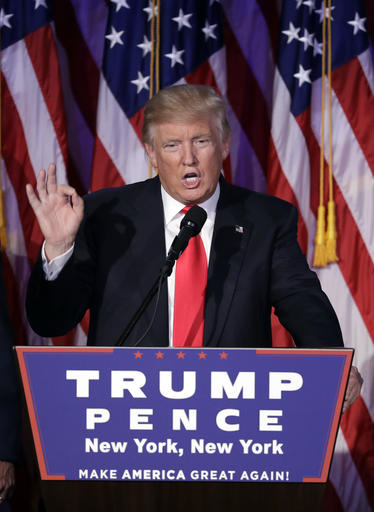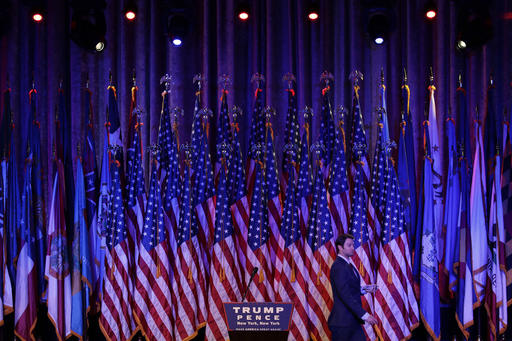Long Walk Home: What’s next for West Virginia?
November 9, 2016 by Ken Ward Jr.

President-elect Donald Trump gives his acceptance speech during his election night rally, Wednesday, Nov. 9, 2016, in New York. (AP Photo/John Locher)
Well, this happened:
Donald John Trump was elected the 45th president of the United States on Tuesday in a stunning culmination of an explosive, populist and polarizing campaign that took relentless aim at the institutions and long-held ideals of American democracy.
The surprise outcome, defying late polls that showed Hillary Clinton with a modest but persistent edge, threatened convulsions throughout the country and the world, where skeptics had watched with alarm as Mr. Trump’s unvarnished overtures to disillusioned voters took hold.
The triumph for Mr. Trump, 70, a real estate developer-turned-reality television star with no government experience, was a powerful rejection of the establishment forces that had assembled against him, from the world of business to government, and the consensus they had forged on everything from trade to immigration.
The results amounted to a repudiation, not only of Mrs. Clinton, but of President Obama, whose legacy is suddenly imperiled. And it was a decisive demonstration of power by a largely overlooked coalition of mostly blue-collar white and working-class voters who felt that the promise of the United States had slipped their grasp amid decades of globalization and multiculturalism.
It seems like a long time since Monday evening, when I was flipping around on the television and landed on C-Span, which was showing Bruce Springsteen’s performance at the big Clinton campaign rally at Independence Hall in Philadelphia. One of the songs he did was “Long Walk Home,” which goes something like this:
In town I passed Sal’s grocery, barbershop on South Street
I looked in their faces, they were all rank strangers to me
Hey Veteran’s Hall high upon the hill stood silent and alone
The diner was shuttered and boarded with a sign that just said “gone”
It’s gonna be a long walk home
Hey pretty darling, don’t wait up for me, gonna be a long walk home
Hey pretty darling, don’t wait up for me, gonna be a long walk home
It’s gonna be a long walk home
Here in West Virginia, the state race was called for Trump literally just moments after the polls closed last evening. Trump’s victory here has long been a foregone conclusion. But looking back now not just at the ultimate result in the Electoral College, but more specifically at the votes of my fellow West Virginians, that song strikes a chord.
The West Virginia that embraces so much fear and hatred isn’t the one I grew up in and continue to try to make a life in and help, in some small way, to improve. I just don’t recognize it. Maybe my heart won’t let me. Maybe I’m blind. I suspect that many West Virginians, including some Republicans, who didn’t vote for Trump feel the same way.
But, I’m also certain that part of the reason that so many West Virginians threw in with Trump is that the West Virginia that’s in front of their eyes doesn’t necessarily look that familiar to them — and really, the country may not look or feel that familiar to them anymore, either. Questions about the nation’s growing diversity and West Virginia’s general lack of diversity, and how that affects our voting patterns, are a bit far afield for this blog, but there’s also something here that relates to our complex relationship with the coal industry that we should all try to think about.
The struggles and pain for families in somewhat isolated pockets of our state where coal has long been the lifeblood — good paying jobs for generations who might not have gone to college, but are hardworking, smart and resilient — is very real. Thousands of coal jobs have disappeared in just a few short years. And most experts provide little if any hope that they’re coming back, despite an expected slight uptick in the met coal market.
What’s emerged though, is an identity politics that’s driven by the coal industry narrative that goes deeper than the much-discussed and highly successful campaign to convince people that the coal industry’s troubles are almost entirely caused by President Obama and his EPA, that Hillary Clinton would continue those policies, and that another president — maybe Donald Trump — would put a stop to that, bringing another huge coal boom that would rescue mining communities.
This deeper narrative, perpetrated by career campaign consultants, isn’t just that coal is West Virginia. It’s that coal is all there is to West Virginia. Too many of us have become convinced not just that coal has been a way of life here for many families and communities, but that it’s the only possible way of life for those same families and communities. This narrative has been used to stoke fear — fear of the future and of the unknown, fear of outsiders and of the entire outside world, fear of a president with a funny name who doesn’t look like most of us, and fear of a “nasty woman” we already weren’t sure we trusted.

A man walks across the stage during preparations for Republican presidential candidate Donald Trump’s election night rally, Tuesday, Nov. 8, 2016, in New York. (AP Photo/John Locher)
That kind of visceral fear isn’t the West Virginia I know and love. And I think deep down, it’s not the West Virginia that most men and women who grew up in coalfield communities know and love. That’s certainly not the way our state has lived and worked and survived now for 153 years. West Virginians are smart, and resourceful. We’re kind and generous. We’re welcoming to strangers. We are forward thinking and not nearly as backward as the multitude of stereotypes have left the rest of the world thinking. At least deep down, at our core. We’ve let the politics of fear maybe change some of that, rather than letting the politics of hope help us find new and better futures.
Frankly, I think some of the folks to the left of the political spectrum don’t really help with all of this.
For one thing, there’s a tendency (especially about young people who have moved away) to jump to defend ourselves against those anyone who dares venture even a little bit over into one of those stereotypes, when in fact, we aren’t very educated and we are too fat and way too many of our families are suffering the effects of drug abuse on their loved ones. The best way to fight those stereotypes would be to fix those problems, not go all crazy on Facebook about them.
We are also overly sentimental about coal’s history sometimes, to the point of romanticizing the fight to unionize or the struggle for justice after a mine disaster. And worst of all, we make it sound like having more coal jobs necessarily meant that everything was fine in the coalfields — that generation after generation didn’t die too soon from black lung or that decades of mining didn’t leave our land scarred and our streams polluted.
That’s not to say that we should ignore our history, or not be proud of parts of it. But pretending that we were something we weren’t won’t help us figure out what we ought to be in the future.
And it’s hard to see how the results of some of the statewide political races are going to help.
Sure, Jim Justice talks a good game about tourism and agriculture and diversifying the economy. But his completely nonsensical statements about climate change and his pandering about coal — we’ll mine more than ever before, he insists — erode his credibility, which is already not that high, given that his business plan for coal is to violate the law, and then not pay the fines, while also being late on all his taxes. The best thing Justice could do is, before he takes office, just pay it all off — all of it. Paid off. That would be the way to show West Virginia families who have put their trust in him that he deserves that trust.
The other Democrats have a lot to learn as well, as do the unions and the trial lawyers. It was a sad thing that some of them resorted to the same kind of gutter politics that they complained about so vocally not so long ago when Don Blankenship was the instigator — and that some groups proclaiming to be in favor of families threw out in the final days of this election.
One thing that’s indisputable is that folks who have been working for many years now to turn West Virginia elections toward the Republican party have done a good job. Look at the results: at Attorney General Patrick Morrisey’s re-election, at the legislative races, at the Board of Public Works. Along with being better organized — and certainly well funded — it’s clear that the Republicans know what they stand for, and they pretty much make it clear to voters what they stand for, even though so much of it is clouded by the “war on coal” cloud of misinformation. The West Virginia Democrats? Does anyone really know what they’re all about?
Certainly, the Republican career campaign consultants and their friends in the coal industry aren’t interested in moving beyond a politics that is all about hate — hating EPA, hating Hillary Clinton, hating anyone who doesn’t share a vision of West Virginia as a natural resource colony where residents have to be grateful for whatever meager bones are tossed our way. They’ll react to this election the way they did to the last one, when they didn’t seem to understand that President Obama had been re-elected, and though he should come ask them for forgiveness or something, when his policies and his agenda won in a landslide.
That leaves the rest of us — the vast majority of West Virginians who, really, probably share more values than the political candidates and their PR agents would have us believe.
As I wrote on Election Day, the task in front of us is not an easy one and the problems are many:
… Like ending black lung disease, avoiding the next mine disaster, doing something about the clear problem of sickness faced by those who live near mountaintop removal mines, about protecting miner pensions and seeing that coal company owners don’t walk away from their growing environmental liabilities.
Most of all, we need to not be afraid — not afraid of the future, or the outside world, or change, or especially of each other. And it’s surely, more than ever before, time to get to work.
Like Springsteen sang the other night in Philadelphia:
My father said “Son, we’re lucky in this town, it’s a beautiful place to be born
It just wraps its arms around you, nobody crowds you and nobody goes it alone
You know that flag flying over the courthouse means certain things are set in stone
Who we are, what we’ll do and what we won’t”

 Subscribe to the Coal Tattoo
Subscribe to the Coal Tattoo
